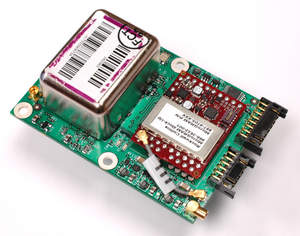Mar 10 2015
Jackson Labs Technologies, Inc., a designer and manufacturer of cutting-edge GPS, timing and frequency equipment, today announced the availability of its breakthrough product SAASM FireFly-IIA GPSDO combining for the first time a P(Y) capable military Selective Availability Anti-Spoofing Module (SAASM) dual-frequency GPS receiver with an ultra-low noise Double Oven Crystal Oscillator (DOCXO) on a ruggedized PC board with dimensions of only 2.0 x 2.85 x 0.9 inches.
The SAASM FireFly-IIA GPSDO is capable of receiving L1 and L2 GPS signals with C/A and P(Y) code, and is optimized for providing a highly accurate and very low phase-noise Position, Velocity, Time, and Frequency reference under extreme environments such as could be encountered in aircraft, tracked- and wheeled-vehicles, and in man-packs.
 SAASM FireFly-IIA GPSDO PVT Reference
SAASM FireFly-IIA GPSDO PVT Reference
The SAASM FireFly-IIA provides various 10MHz, 1PPS, and Position- and Velocity information ("PVT Assured Operation") to the user operating even in hostile environments using Anti Spoofing and Anti Jamming technology. A built-in DOCXO with extremely low phase noise and high Allan Deviation (ADEV) performance provides accurate timing and frequency performance even when in GPS holdover mode, and allows for very low temperature and acceleration sensitivity. Using the latest generation Rockwell Collins MicroGRAM SAASM GPS Receiver combined with a DOCXO results in phase noise of typically less than -102dBc/Hz at 1Hz offset, -138dBc/Hz at 10Hz offset, a noise floor of less than -158dBc/Hz, and ADEV performance in the parts per trillion or lower averaged from 0.01s to months. The SAASM FireFly-IIA DOCXO provides a very high thermal stability of only 0.2ppb over a temperature range of -25 °C to +85 °C and a ruggedized g-sensitivity of only 0.3ppb per g per axis with less than 3.7W steady-state power consumption. The SAASM FireFly-IIA includes a standby-zeroize feature that allows emergency key-zeroization without requiring prime-power by utilizing only a small Alkaline or Lithium backup battery. The unit also provides software-initiated key zeroization and status query. Key loading is accomplished through Defense Advanced GPS Receiver (DAGR) interfacing standard key fill protocol DS-101 using RS-232 communication, and an optional DAGR standard external cold-start assist feature is available to synchronize the unit inside a vehicle for example in the absence of GPS signals.
The SAASM FireFly-IIA builds upon the very successful and mature Jackson Labs Technologies, Inc. SAASM HD CSAC and FireFly-IIA technologies allowing the unit to achieve parts-per-trillion (ppt) average frequency accuracy and stability, and better than 25ns UTC average phase synchronization with less than 12 minutes operational warmup time and less than 5 minutes calibration to UTC typically. Frequency stability over 24 hours with GPS reception is better than 6E-013 (0.6ppt) typically, exceeding Stratum-1 requirements.
The SAASM FireFly-IIA contains an industry-standard 12-channel SAASM-enabled micro GPS receiver allowing +12V +/-1V operation, and supports easy-to-implement NMEA as well as SCPI serial commands. Separate RS-232 communication interfaces to the SAASM GPS receiver allow communications in DAGR standard ICD-153 interfacing format as well as cold-start-assist, key-loading, and firmware upgrades. The SAASM FireFly-IIA GPSDO is delivered in -40 °C to +85 °C temperature range and is available for sampling now. The SAASM FireFly-IIA GPSDO has been granted Security Approval by the Global Positioning System Directorate.